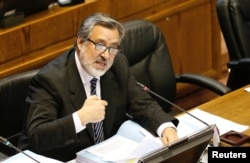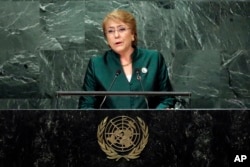A wave of recent arrivals from Haiti and Venezuela has spurred Chile's presidential candidates to tap into and stoke anti-immigrant sentiment, turning it into a key issue in the campaign for the Nov. 19 election.
Latin American politics has rarely featured this type of criticism of immigrants by hopefuls on both right and left, at times recalling the language that has helped build support for Donald Trump in the United States, Nigel Farage in Britain and Marine Le Pen in France.
Former president Sebastian Pinera, frontrunner to represent the right-wing coalition in November's election, has blamed Chile's outdated immigration laws, written in the 1970s, for "importing problems like delinquency, drug trafficking and organized crime."
"Many of the criminal gangs in Chile, like those that clone credit cards, are foreigners. This is particularly bad in the regions where immigrants represent a large percentage of the population," said Pinera, a center-right billionaire.
Alejandro Guillier, frontrunner in polls to win the backing of Chile's leftist bloc, has said Chile needs a "more selective migratory policy." Guillier represents the northern mining region of Antofagasta, which has seen some of the highest levels of immigration and has suffered economically in the recent commodities slowdown.
Making immigration a mainstay issue of the 2017 presidential campaign could deepen divides in Chilean society, say concerned lawmakers, government officials, and community leaders, worried that recent arrivals could become scapegoats for the country's ills.
Candidates "see they can take advantage politically and start using nationalist rhetoric, blaming many of the nation's problems on immigrants," said independent senator Pedro Araya.
Chile's government migration office said immigrants commit fewer crimes proportionally than Chileans. Interior under-secretary Mahmud Aleuy called Pinera's comments "extremely irresponsible."
Still, center-left President Michelle Bachelet, scrambling to bolster falling approval ratings, has pledged to present a bill soon to revamp immigration rules. She has not yet revealed details.
Polling data shows a hardline stance may resonate with voters.
Some 75 percent of those surveyed by pollster Cadem in December said Chile should adopt stricter immigration policies, and 45 percent said immigration was bad for the nation, compared to 41 percent who said it was good.
Immigration Rise
In recent years, Chile's economic growth and stability have made it an attractive destination for other South Americans, and also for migrants from the Dominican Republic and Haiti, Latin America's poorest country.
Immigration to Chile remains low proportionally compared to most developed countries, yet it has grown five-fold over the last 30 years, statistics from the government's immigration service show.
Arrivals from Haiti surged 144 percent in 2015, while those from recession-hit Venezuela soared 192 percent.
The arrival of foreigners of African descent into largely Caucasian and Mestizo Chile has made migration more visible in cities, the immigration service said.
Immigrant groups complain they are being treated as scapegoats by politicians looking to score points.
"This talk is used to divide us and create a sense of nationalism," said Haitian immigrant Emmanuel Cimeus, who heads an organization for immigrants from his country.
Cimeus said he has seen people on streets hurl racial epithets and yell "criminals go home" at his countrymen.
Politicians need to be more careful with their words, said Laurence Blair, Chile analyst for The Economist Intelligence Unit.
But he said he is "cautiously optimistic" that pragmatism will prevail when it comes to actually implementing policy.
"We're not going to be seeing a wall being built on the border with Peru or Bolivia," he said. "Chile won't be doing the full Trump."











